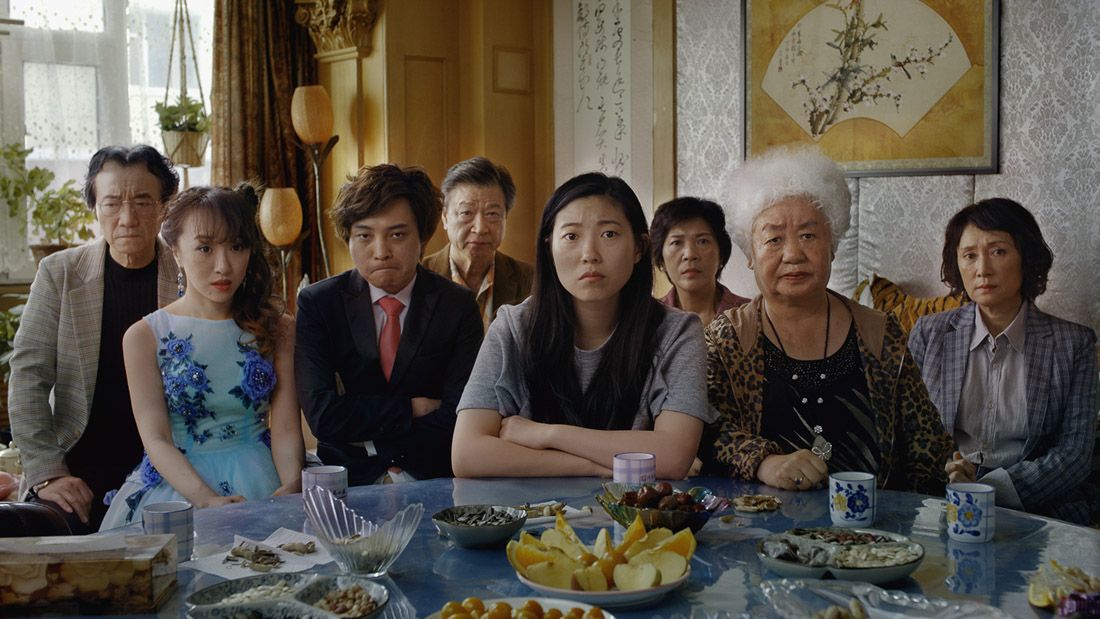Writer-director Lulu Wang’s semi-autobiographical feature The Farewell is a deeply moving work of tenderness and insight. It’s about a grandmother (Shuzhen Zhou) with a fatal diagnosis — lung cancer, advanced, survivable for only months — and a family that loves her so much they won’t tell her the real test results. (“Benign shadows” her sister (Hong Lu) will comfortingly say instead.) In fact, they’ll have a cousin (Han Chen) and his girlfriend of three months (Aoi Mizuhara) rush things along in order to throw a wedding, simply to give everyone a chance to see Nai Nai one last time. This gives the film a rich layer of dramatic irony over every scene, enhanced by cultural specificity. Our main character, struggling young author Billi (Awkwafina), is the old woman’s beloved granddaughter, a Chinese-American who sees in this sad news another connection to her homeland disappearing. She moved to New York at a young age, with her parents (Tzi Ma and Diana Lin) attempting to start fresh with new opportunities. They haven’t forsaken China; they’ve merely moved, like Nai Nai’s other son (Yongbo Jiang), who brought his family to Japan years ago to pursue his line of work. (What fascinating immigrant stories, playing out matter-of-factly as an ongoing background context.) Thus the warm, loving, kindly opinionated old woman beams to have her family all together around her table — the first time in 25 years she marvels. In warm and prickly sequences of family togetherness, old memories are shared, old conflicts are gingerly prodded, and traditions are revived with great pathos and care. Everyone’s connecting — Wang gives us intimate Demme-esque head-on shots, the better to feel the warmth of a grandmother’s smile, the charm of an auntie’s matter-of-fact revelation, the compassion of a granddaughter’s yearning — as emotions rush in and are tamped down, only to bubble up in English so Nai Nai won’t understand, or later in hotel room tears.
The movie is a direct, pure expression of a family in slow-motion unspoken crisis embracing their opportunity to spend time together. They're trying to carefully say their goodbyes, every nugget of wisdom suddenly precious, every hug held a little tighter and longer than usual. There’s love and sadness all around, a sense of time passing that must be held on to while they can manage it. Wang’s writing is sharp and sensitive, never betraying the characters with false conflict or forced sentimentality. She frames scenes to allow honest interactions that build and ramble like a real family’s hangouts would, and finds scenarios to draw out gentle humor and casual wisdom. It’s a film that feels lived-in, beautifully acted in every role, carefully composed to highlight the lead’s discomfort and displacement while taking great comfort in the grandmotherly presence that anchors and fills every scene. It’s the opposite of classic generational dramas like Leo McCarey’s Make Way for Tomorrow or Yasujiro Ozu’s Tokyo Story, in which the elderly are slowly marginalized. Here Nai Nai is the center of attention, in a film gently perched on the fragility of someone so beloved. The family loves her too much to admit to say goodbyes, even though it’s inevitable. How lucky they are to have her, and how loved she must feel to have them there, even when it’ll be bittersweet to see them leave. The movie has that same sweetly overwhelming power to linger in this irreconcilable need to appreciate love and then let go.


No comments:
Post a Comment